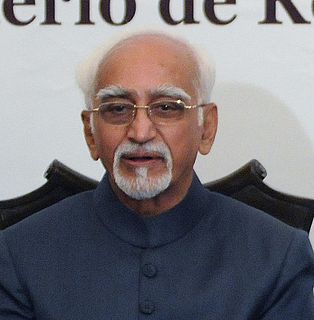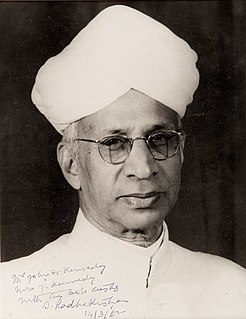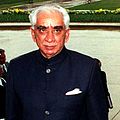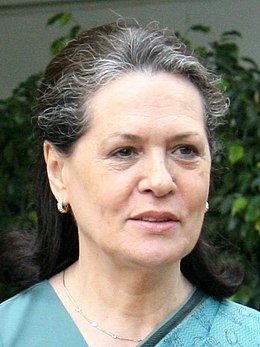
Sonia Gandhipronunciation (help·info) is an Indian politician of Italian descent. A member of the Nehru–Gandhi family by way of her marriage to Rajiv Gandhi, she is a former president of the Indian National Congress. She took over as the party leader in 1998, seven years after her husband's assassination, and remained in office for a record nineteen years, a period that was characterised by the party's renewed adherence to the centre-left position on the Indian political spectrum.

Purno Agitok Sangma was an Indian politician who served as the Speaker of the Lok Sabha from 1996 to 1998 and Chief Minister of Meghalaya from 1988 to 1990.

Legislative elections were held in India in four phases between 20 April and 10 May 2004. Over 670 million people were eligible to vote, electing 543 members of the 14th Lok Sabha. The Lok Sabha, or "House of the People," is the directly elected lower house of the Parliament of India.
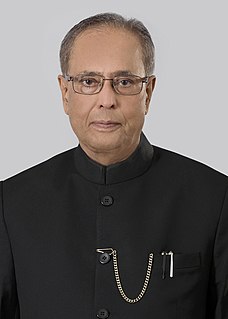
Pranab Mukherjee is an Indian politician who served as the 13th President of India from 2012 until 2017. He is a Bharat Ratna awardee, awarded in 2019 by President of India Shri Ram Nath Kovind. In a political career spanning five decades, Mukherjee has been a senior leader in the Indian National Congress and has occupied several ministerial portfolios in the Government of India. Prior to his election as President, Mukherjee was Union Finance Minister from 2009 to 2012.

Jaswant Singh is a retired officer of the Indian Army and a former cabinet minister. He is a founding member of the Bharatiya Janata Party. He is one of India's longest serving parliamentarians, having been a member of one or the other house almost continuously between 1980 and 2014. he was elected on a BJP ticket to the Rajya Sabha five times and to the Lok Sabha four times. During the Vajpayee administration (1998-2004), he held some of the highest offices of the land, handling at various times the cabinet portfolios of Finance, External Affairs and Defence. He also served for a period as Deputy Chairman of the Planning Commission (1998–99). In the aftermath of India's nuclear tests of 1998, he was deputed by Prime Minister Vajpayee to act as India's single representative to hold repeated, long-term dialogue with the USA on matters related to nuclear policy and strategy; the outcome of the sustained engagement was positive for both countries. After his party lost power in 2004, Jaswant Singh served as Leader of Opposition in the Rajya Sabha from 2004 to 2009.
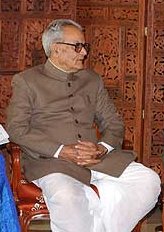
Bhairon Singh Shekhawat was the 11th Vice President of India. He served in that position from August 2002, when he was elected to a five-year term by the electoral college following the death of Krishan Kant, until he resigned on 21 July 2007, after losing the presidential election to Pratibha Patil. Shekhawat was a member of the Bharatiya Janata Party (BJP), a leading member of the National Democratic Alliance at the time of election. He served as the Chief Minister of Rajasthan three times, from 1977 to 1980, 1990 to 1992 and 1993 to 1998.

Najma Akbar Ali Heptulla is an Indian politician and the current Governor of Manipur and the Chancellor of Jamia Millia Islamia. She is a former vice-president of the Bharatiya Janata Party (BJP), and a six time member of the Rajya Sabha, the Upper House of the Indian parliament, between 1980 and 2016, and Deputy Chairman of the Rajya Sabha for sixteen years. She was a member representing Rajasthan from July 2004 to July 2010. She was nominated by the BJP for the Rajya Sabha in 2012 from Madhya Pradesh, and assumed her office on 24 April 2012.

Pratibha Devisingh Patil is an Indian politician who served as the 12th President of India from 2007 to 2012. A member of the Indian National Congress, Patil is the only woman so far to hold the office. She previously served as the Governor of Rajasthan from 2004 to 2007.

The Election Commission of India held indirect 13th presidential elections of India on 19 July 2007. Pratibha Patil with 638,116 votes won over her nearest rival Bhairon Singh Shekhawat who got 331,306 votes. This result meant that Pratibha Patil became the first female President of India.

India held general elections to the 15th Lok Sabha in five phases between 16 April 2009 and 13 May 2009. With an electorate of 714 million, it was the largest democratic election in the world till the Indian General Elections 2014 held from 7 April 2014.

The Indian general election, 2014 was held to constitute the 16th Lok Sabha, electing members of parliament for all 543 parliamentary constituencies. Running in nine phases from 7 April to 12 May 2014, it was the longest election in the country's history. According to the Election Commission of India, 814.5 million people were eligible to vote, with an increase of 100 million voters since the last general election in 2009, making it the largest ever election in the world. Around 23.1 million or 2.7% of the total eligible voters were aged 18–19 years. A total of 8,251 candidates contested for the 543 Lok Sabha seats. The average election turnout over all nine phases was around 66.38%, the highest ever in the history of Indian general elections.

The 14th indirect presidential election, in order to elect the 13th president, was held in India on 19 July 2012. The last date for filing nominations was 30 June, whereas the votes would be counted on 22 July. The two leading candidates for the presidency were former Finance Minister Pranab Mukherjee from West Bengal and former Speaker of the Lok Sabha Purno Agitok Sangma from Meghalaya.

The Bharatiya Janata Party (BJP) is one of the two major political parties in India and was the main opposition party during the 15th Lok Sabha. It contested the 2014 parliamentary election as the leading party of the National Democratic Alliance with Narendra Modi as its Prime Ministerial candidate and party president Rajnath Singh as the chief-of-election of campaign. The important issues during the campaign included price hike, corruption, economy, security, infrastructure such as roads, electricity and water. The party promised a vibrant and participatory democracy, inclusive and sustainable development, quality life, productive youth, globally competitive economy, open and transparent government, pro-active and pro-people good governance in its manifesto.
On 4 February 2008 a by-election was held in for the Simaria (SC) seat of the Legislative Assembly of the Indian state of Jharkhand. The by-election was called after the death of the sitting MLA Upendra Nath Das.

A presidential election was held in India on 17 July 2017 with the votes counted and the results announced on 20 July 2017. Ram Nath Kovind became 14th President of India. President Pranab Mukherjee, whose term of office was due to expire on 24 July 2017, declined to seek re-election due to health concerns and old age.
The elections to the next Vice-President of India, were held on 5 August 2017. The announcement was made by the Election Commission of India.

The 1974 Indian vice-presidential election was held on 27 August 1974. B. D. Jatti defeated his opponent, Niral Enem Horo to become the fifth Vice-President of India.

